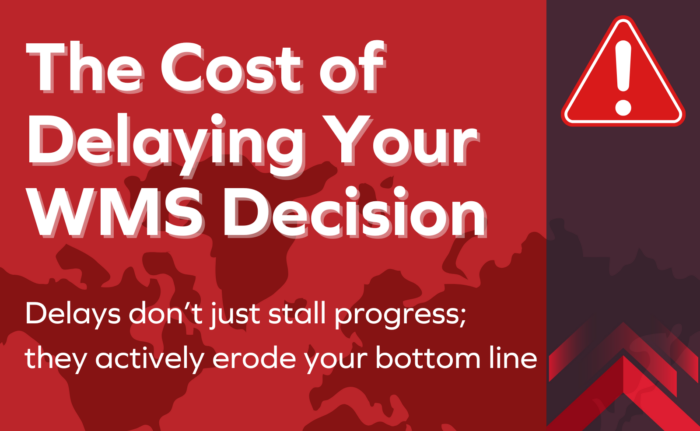
Choosing the right Warehouse Management System (WMS) is one of the most critical moves a business can make when it comes to strengthening and scaling supply chain operations. For many leaders, it’s not a decision they’ll face often — and when it does come around, it’s a high-stakes project that demands significant time, budget, and expertise. That’s why bringing in an experienced consultant to guide your warehouse management software selection can make all the difference.
We sat down with seasoned supply chain experts who have been in the trenches of WMS selection and implementation. Their biggest lessons learned? We’ve distilled them into five key ways consultants help ensure WMS selection success.
Warehouse Management Software Selection Lesson 1: Planning for Future Needs
One of the most important things a consultant brings to the table is an objective lens. Instead of simply documenting your current processes, they help define the future state of your operation. Many businesses assume digitizing existing processes is all they need, but that often leads to automating inefficiencies.
Howard Turner, Director of Supply Chain Systems at St. Onge, explains: “You can’t just drop a WMS on top of what you’re doing today. You’d only enable yourself to do bad things faster and more efficiently.”
Consultants challenge assumptions and work with stakeholders to identify best practices that align with your unique order profiles, product mix, and business goals. For example, cross-docking may be a great best practice on paper, but if your suppliers and order velocity don’t support it, the result could be bottlenecks instead of benefits. With a forward-looking approach, consultants help ensure you’re implementing solutions that enable transformation — not automation of the status quo.
Warehouse Management Software Selection Lesson 2: Defining Business Requirements
With a future state mapped out, consultants then turn to building detailed business requirements. These requirements form the foundation for evaluating WMS solutions and make sure everyone — from IT to operations — is aligned on what success looks like.
Amit Kirpalani, Vice President of Supply Chain Solutions at enVista, emphasizes the value of experience here: “Having done this many, many times, several times a year, we’ve built the methodology and the accelerators that allow us to do a deep dive into a client’s unique business requirements to help evaluate and select a solution that best fits the client’s long-term needs.”
This disciplined process ensures you’re not just buying software, but the right solution tailored to your goals.
Warehouse Management Software Selection Lesson 3: Managing the Vendor Selection Process
The vendor landscape is crowded, and navigating it alone can be overwhelming. Consultants know the players inside and out — what works, what doesn’t, and which solutions are the best match for your needs.
They help you:
- Narrow the field to realistic contenders
- Run structured RFPs and RFQs that create transparency
- Script demos around your workflows, not the vendor’s canned pitch
- Validate claims through reference checks and site visits
Kirpalani notes another benefit: “Hiring WMS consultants to get the value and do the due diligence is going to pay for itself in cost avoidance. It also helps with negotiation because vendors generally give better pricing when you have a WMS consultant in play.”
With the right consultant, you’re not just buying a system — you’re negotiating from a position of strength.
Warehouse Management Software Selection Lesson 4: Leveraging Deep Industry Knowledge
For most companies, selecting a WMS is a once-in-a-career decision. For consultants, it’s something they do multiple times a year. That repetition builds unmatched expertise.
Turner puts it simply: “Typically, for most of our clients, this is a once-in-a-career decision. For us, it’s something we do multiple times a year — so leveraging that experience can save you a lot of headaches.”
From understanding vendor roadmaps to anticipating pitfalls, consultants provide insights you can’t replicate internally. They also bring broader supply chain perspective — including ERP, TMS, and automation strategy — ensuring your WMS integrates seamlessly into the bigger picture.
Warehouse Management Software Selection Lesson 5: Ensuring a Long-Term Strategic Fit
Finally, consultants help you think beyond go-live. They push you to evaluate:
- Integration capabilities with OMS, TMS, and ERP systems
- Scalability as order volumes and product lines grow
- Vendor implementation plans and support models
By focusing on long-term fit rather than short-term fixes, consultants ensure your WMS investment delivers lasting ROI.
The Bottom Line
A WMS consultant isn’t just there to keep the project on track—they’re a true strategic partner during your warehouse management software selection journey who brings focus, discipline, and confidence to the process. From shaping a vision of your future operations to guiding vendor evaluations and contract negotiations, their experience helps you sidestep costly missteps and move forward with certainty.
When it comes to choosing a WMS, the stakes are high. Bringing in the right consultant can mean the difference between unlocking a supply chain transformation and getting stuck with a system that slows you down.
Have more questions about hiring a WMS consultant?
Watch: Why You Absolutely Need to Work With a WMS Consultant
Read: 8 Reasons Why Hiring a WMS Consultant Makes Sense
Want to catch up on the latest WMS trends?
Watch: Let’s Talk WMS: 2025 Gartner® Magic Quadrant™ Findings and Market Analysis
Read: ASK THE EXPERTS: WMS Market Breakdown: What’s Now, What’s Next


